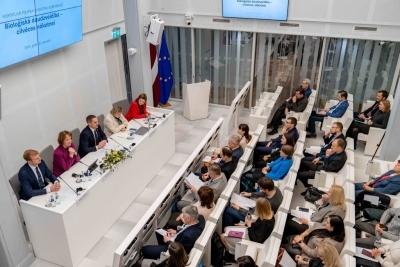It the beginning of February, discussions began in the Saeima’s Sustainable Development Commission on the topic of biodiversity conservation in Latvia - an issue that is highly relevant both for environmental protection and for sustainable forest management and land use. For these discussions to be constructive and data-driven, a comprehensive assessment of the current situation and an agreement on key principles are essential.
Representing forest owners and forestry professionals, the Latvian Forest Owners’ Association submitted several proposals to the Commission. Their goal is to create a more predictable environment for households owning forests, develop a more inclusive nature conservation system, introduce a fair compensation mechanism, and optimize forest area management while maintaining a balance between environmental protection and economic development.
The key proposals include:
- A clear understanding of existing forest areas with economic activity restrictions – including buffer zones along water bodies, peatland protection zones, areas with seasonal limitations, and others. It is crucial to know how much land is already under different levels of restrictions, as this information is vital for further policy planning and developing sustainable solutions.
- Agreement on the maximum percentage of forest areas where restrictions can be applied, while assessing their impact on national economic development and welfare. In other areas, a voluntary, contractual conservation system should be promoted based on the “safe harbor” principle.
- Transition to high-quality nature conservation, applying the principle of dynamic conservation, which recognizes that natural processes are ever-changing. This would allow the replacement of less valuable restricted areas (e.g., an uninhabited nest site with micro-reserve status) with newly identified areas of exceptional ecological value, while maintaining the overall share (%) of restricted forest land.
- Agreement on management practices within restricted areas that are not strictly protected, ensuring efficient and adaptive management of such territories.
- Reducing bureaucracy in forest areas outside protected territories, allowing especially small forest owners to make independent management decisions more freely, while encouraging participation in voluntary (contract-based) conservation systems.
- Establishing a fair compensation system that fully offsets all losses incurred by forest owners as a result of imposed restrictions.
- Creating an inter-ministerial working group including representatives from the Ministry of Environmental Protection and Regional Development, Ministry of Agriculture, Ministry of Finance, Ministry of Economics, and Ministry of Climate and Energy to address the above issues comprehensively and ensure coordinated action.
These proposals emphasize the need for an integrated approach - one that establishes a shared understanding of land-use policy, determining how much forest area can be restricted for economic activities while considering national economic development goals and budgetary needs, including defense expenditure.
A thorough evaluation of the current situation, clearly defined management practices, and a fair compensation system form the foundation for sustainable implementation of biodiversity policy. Only a data-driven approach, combined with broad cooperation among all stakeholders, can ensure both the preservation of biodiversity and future economic prosperity.
📰 Published in the magazine “Čiekurs”, p. 3

